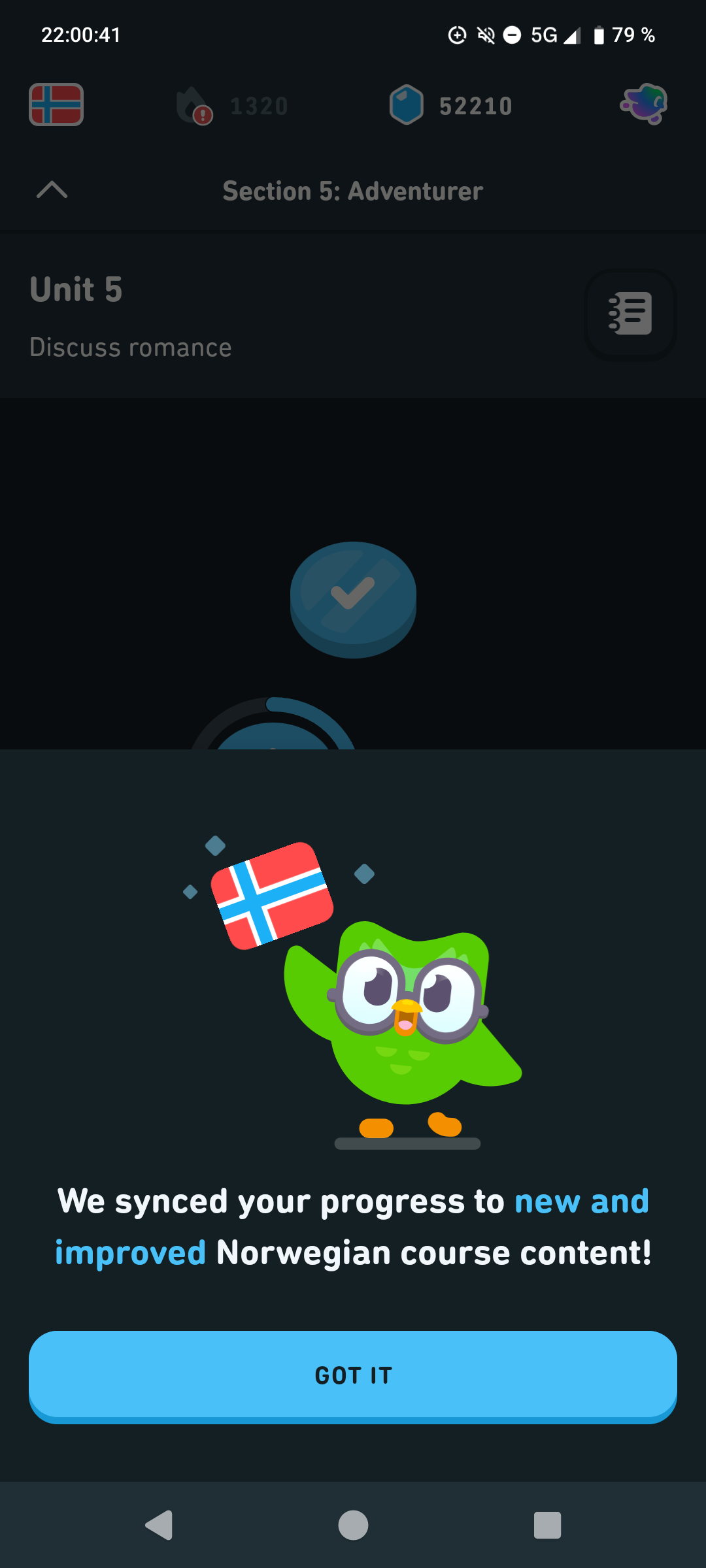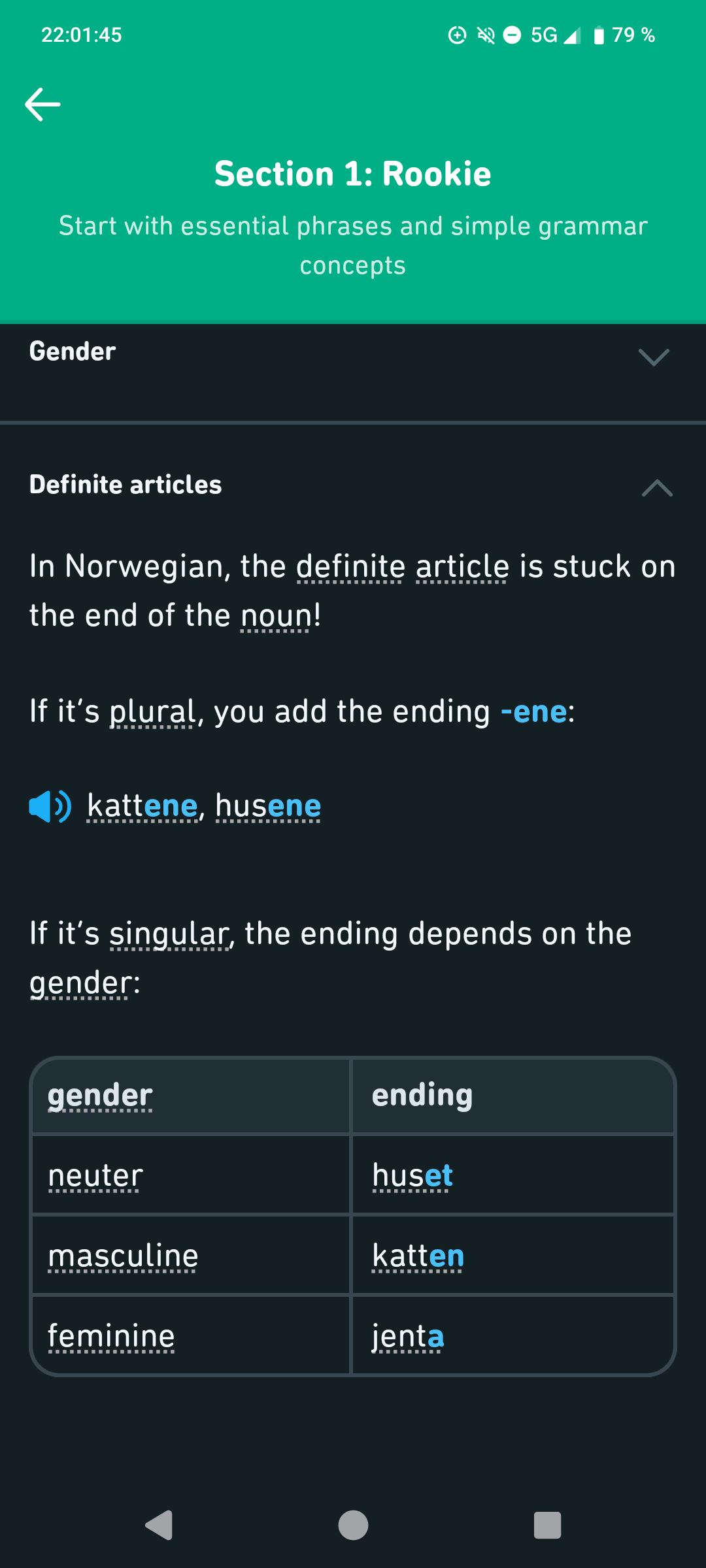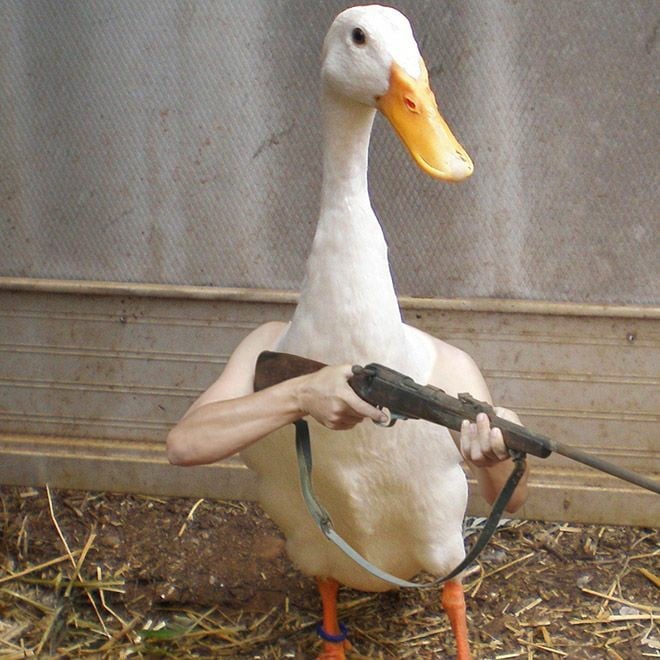I got free of duolingo when I realized wasn’t really learning anymore and just trying to keep my streak up
My kids were big into Duolingo, one learning Finnish and the other learning Japanese. So I didn’t mind paying for extra stuff because, hey, it’s educational.
But then I’d ask them to say something in Japanese, or what something says - we watch a lot of anime - and they wouldn’t be able to. So I don’t pay for it anymore because it’s not actually educational.
Interestingly, I’m watching this great video as I type this which compares Duolingo to a casino, and I don’t entirely disagree.
Duolingo is just a tool, I think. You can’t rely on it entirely to learn a language. And especially you have to take an active role in learning when using duolingo. I’m using it to learn Japanese, and I think I’m picking it up somewhat decently.
But what I do is that I don’t look at the word banks when translating, and when there’s a listening activity, I don’t look at the text on the screen. I just try to follow entirely based on what I hear. I always say the Japanese out loud, and I try to form sentences in Japanese by forcing myself to think in Japanese (as opposed to thinking in English and then translating the words into Japanese). And, of course, use other resources to figure out the nuances of the grammar and the vocabulary!
I think if you view duolingo as a way to get more practice with the language, it’s actually a fantastic resource. You just can’t rely on it as an exclusive learning tool
Also, the Japanese that’s spoken in anime isn’t really colloquial Japanese or really even the same Japanese that duolingo covers. Heavily exaggerated example, but it’s a bit like asking someone to translate Shakespeare when someone is learning English. There will be some words that they can pick up, so your children might be able to get the gist of what’s being said, but the tone and wording isn’t really the same.
Not to mention, Japanese is spoken really quickly. Iirc, it’s one of, if not the, fastest languages spoken, when measured in syllables over time. You would find better success with asking your children to translate if you find a Japanese speaking online personality who is known to speak slowly and clearly. Hololive is actually pretty good on this front
You’re absolutely right. If my kids were living in Finland or Japan then practicing the language they experience every day would help to form the connections that make a language “stick.” I’m reminded of the only good scene from The Thirteenth Warrior where Antonio Banderas explains how he learned the Viking language with two words: “I listen.”
That being said, it’s far better than my education in French. I took four years in high school and three semesters in college and can barely understand it. Plus I didn’t have nearly as much fun as them.
I think that’s also how you get to being able to think in another language too. When you’re immersed in it, it seeps into your thought process.
In lots of Canada we have French immersion schools, where English-speaking kids who never encounter French outside of the classroom can become quite fluent in French by giving over half their instruction in French. With age and a few hours of exposure per day, it etches itself into the brain pretty well.
I don’t completely agree that anime Japanese is so different from real life Japanese. There is certainly some grammar used that, while correct Japanese, would very rarely be used in real speech. But for the most part, once you have a solid foundation of the language down, and anime or untranslated manga can become very good tools for learning. However, I would not use anime or manga for learning until you know enough to know what is out-of-place and should not be used in real life speech.
I feel as though using structured learning via textbook and—if possible—class (in person or online) is ideal until about early intermediate level. You can tell that there has been a lot of thought into what is taught when. After that, learning on your own becomes easy as you can easily identity what you don’t know and what exactly you need to look up.
i’ve been doing some 15 minutes of duolingo japanese for almost 10 months now, and i think i know a bit of japanese, and i could vaguely understand lyrics of songs if i stop it and read the text, i think the main issue for some people is that they only do it to “keep the streak”, which is the case for a lot of my irl friends, and they barely learnt anything. One of my friend did do a large number of russian lessons daily, and i think he now knows quite a bit of russian (aka, can speak)
i dont think i’ll be able to speak japanese in a daily convo in quite a while, cuz im too scared to speak, however im starting to understnad what they are speaking, so its not entirely accurate to say duolingo is pointless, cuz it really depend on ur attitude towards it
also, almost none of the anime kids ive met know any amount of japanese, the two topics couldnt be any more different
Duolingo isn’t a way to learn a language, in my opinion. It is really helpful, but I don’t remember new things from duo lessons. It’s only helpful to remember stuff I’ve learnt in actual language lessons. I’ve gotten better at German since I started duolingo but I haven’t learnt anything new.
Duolingo is better than nothing. But watching movies with subs will help u much more. Writing anything using language u want to learn is also a good way to get better at writing and probably reading.
Watching movies is certainly a good way to help your foreign language skills, but it’s practicing comprehension more than anything.
Being forced to formulate sentences on your own is a different skill that requires practice as well if you actually want to be able to speak a language. If Duolingo is too mechanical for you, there are other apps that let you find and chat with people who are interested in language exchange.
You can try any online app (like lemmy) where you can chat with native speakers.
You can join Discord servers for practicing your speaking (I would like to know a good open source alternative, but I don’t) or some chat roulette. But first you need to have good comprehension, if you have it you probably can put few sentences together.
I’ve found that when I watch something in another language with subtitles, I find myself going by what I heard, and using the subtitles to support or reinforce sections or words I didn’t understand. I often end up disagreeing with how things are translated, or there is something said in the foreign language that can’t simply be translated. In other words, I think using subtitles as reinforcement can be useful, whereas just reading every line and not thinking in the other language for yourself might not really be helping you much.
Right, I’m not saying it’s useless, just a different type of learning. As you said, it’s more of a reinforcement activity — repeating the words you may have already learned and putting them into a variety of real life contexts helps you remember them better.
However, at least personally, I do find it rather difficult to learn new words that way unless I constantly pause and rewind, which breaks the flow of the story and ends up not being super enjoyable.
When you learn new words, you need to actively repeat them a bunch of times until they stick, and Duolingo seems better suited for that.
I believe there’s a way to get around the paid stuff if you set up the account to be in a classroom or something, if you’d still wanna block the ads.
Or if you have an android you can just get an unlocked apk and use that.
Duo is at best a supplementary tool. If you’re doing nothing except Duo, of course you can’t speak the language. Fucking owl.
I find duolingo works fine for learning new words or just practicing the language. Starting to learn is just hard because the lessons are not structured well and concepts really are not explained at all sometimes. Bit it might just be my experience because I am learning a less popular language.
I used to recommend the owl to everyone back when the discussions were free to access to anyone. Now that they hid it behind the paywall, there’s no explanation at all why a certain word would be the right (or wrong) answer, how you would use the word in other situations or any other interesting fact. Without the discussions (plus the way they re-structured the Spanish course, setting me back and making it even longer), DL is just a dragged out beginner’s vocabulary. I guess it’s still okay for the very basics, but I don’t really feel I have learnt much in two months.
Yeah. After a while you know, how it works and can beat the system (and yourself) which does not make any sense.
- First word of the sentence with capital Letter
- Just a few short words to write (in espanol every time __ “es”)
- In memory you can first play all words and the difficult word is the last

but lol, still upvoted
Spanish or vanish
French or clench
Japanese or broken knees
Russian or crushin
Learn Finnish or else you’re finished
Fluent in Italian or face the battalion.
I’ll have to break those niko niko knee caps

I started duolingo a few weeks ago and I’m loving it. I turned off almost all notifications though.
They’re like an ex that I’ve blocked on everything and send emails. Its been 30 days, you obviously never cared!
I like it too, learned hiragana and katanana in two weeks.
Kanji I’m doing with flash cards tho, and supplementally I read Japanese children’s stories since Duolingo alone isn’t enough to actually learn.
Finally I use Meetup and attend language practice sessions so I can use it with native speakers.
Futurama fans:

The biggest issue I had with duolingo when learning Norwegian was at the beginning and when introducing new concepts like definite articles.
The fucking app for some reason does not have tips (well they do now, but they are not really tips just the lesson vocab) but the website has them and they really are way better at explaining how some things work or are formed. The lesson just throws words at you and expects you to figure out how the concept works completely on your own.
I had so many mistakes when I was learning the definite article because some words were only ever given in the definite form and I had no idea and just thought that is how the words were.
The system works alright when you get the grammar and the basic langiage structure and the lessons basically just add more vocabulary. But the beginning of a course is unstructured and sucks absolute ass without any real explanations. Maybe more popular languages are more structured but that has just been my experience and I have a 1320 day streak currently
The lesson just throws words at you and expects you to figure out how the concept works completely on your own.
Yeah I feel like most of the big language learning apps do this to a degree, but Duolingo is especially lazy about it. They’ll justify it by saying “it’s the natural way to learn a language” or “this is how native speakers learn the language as children”. But like, I’m not a child, I don’t care about the “natural way”, I just wanna know how to speak the language without sounding like a fucking dunce. I’m an adult now, I understand the overarching structures and concepts of languages like grammar and conjugation. Tell me those rules up front and I promise I will learn the language faster.
That being said, the more “brute force” approach that duolingo and others employ can work, it just takes a really long time of consistent practice to pick up on the subtleties. I think that’s part of why they put so much emphasis on the gamification aspect - it keeps people coming back for 1320 days in a row lol, and you figure things out eventually. It’s also easier to build lessons around simple flashcard-based exercises, rather than actually figuring out and documenting the rules and structures of a language in the app. It’s also way easier to monetize the lessons when they’re gamified.
So all that to say, I totally agree with you, Duolingo kinda sucks, but I also kinda understand the reasoning behind why they structure it the way they do.
Yeah I have gone over that hard phase quite a long time ago and now the system is alright as I basically just learn new words. But yeah as I said I could not for the life of me figure out that definite articles attach to the end of words and when they do that (does not help that my native language is a slavic one that does not even have articles like a and the).
The thing that actually pisses me off most about that is that these tips and actual rules are explained in the tips on the web version of duolingo. The app version only got tips for norwegian about a year ago and for some god damn reason they are not even the tips from the website but just the fucking lesson glossary.
Oh yeah thanks very much it really helps me to understand how a concept works when I can see 4 sentences that appear in the lesson without any additional info.
Edit:
I guess most of my rant just got invalidated. I just opened the app and apparently they updated the system.


I mean it still sucks you can only look at that after finishing a section but at least it is there.
Native Americans looking stressed.
I don’t know how to do pictures.
Depends on the specific group some tribes see them as wise mystical creatures like a teacher of sorts
Duo pecked my eyes out because I skipped my Italian lessons one day. You don’t want to know what the bear did.
Itchy knee
San, she go
Also aliens weirdly enough Owls and aliens
I’ll never use Duolingo or any other product whose company posts “organically” on social media like Duolingo does.
It should be illegal for brands to post comments on personal social media (this includes things like reddit, lemmy, or Tiktok), as doing so forces the user’s page to serve as a billboard for the brand while the user receives no compensation for this implicit endorsement and only even has autonomy in this advertisement in so far as their ability to delete the brand’s comment, assuming they noticed it in the first place. It’s disgusting. Duolingo isn’t allowed to come to my house and put a sign in my yard without my permission, so they shouldn’t be able to effectively do the same thing in our digital yards either.
They can’t come in your house because you own the house and you set the rules.
With social media, you and Duolingo are both guests in someone else’s house, and the host has decided you two may interact. Your remedy is to leave 🤷♂️
In principle, sure, but this basically becomes the “are social media providers modern common carriers” debate, unless you choose to look at the issue with the least possible nuance.














